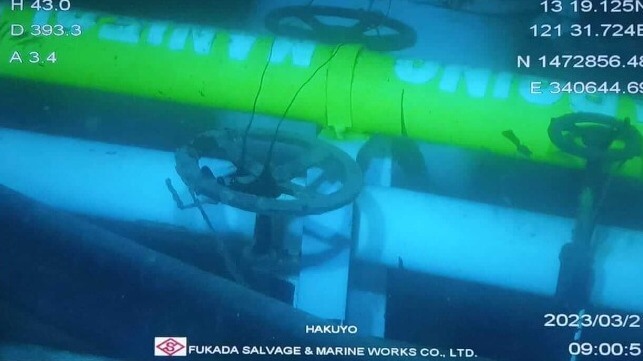Salvors Begin Oil Containment and Removal for Princess Empress Wreck

The Philipping Coast Guard and a Japanese salvor have begun a bagging operation to seal off leaks from the sunken tanker Princess Empress, one month after the vessel went down south of Luzon. A supplier from the United Kingdom provided specialized bags for the purpose, which will be installed using an ROV from the Japanese salvage vessel Shin Nichi Maru.
“We are grateful for all the support from the other countries in addressing this emergency. We hope that along with these international assistance, the integrated response between government agencies and the local government units will enable us to accelerate the effort to contain the leakage,” said Ariel Nepomuceno, head of the Philippines' National Disaster Risk Reduction and Management Council.
The bagging operation is a preliminary step in the remediation process. After sealing identified leaks, the salvors will use hot tapping to siphon off the tanker's fuel oil cargo.
Illustration of typical hot tapping process
The product tanker Princess Empress went down off Pola, Oriental Mindoro on February 28. The crew were rescued safely by a good samaritan vessel, but petroleum began to leak out of the wreck's cargo tanks, spreading a plume that eventually reached from Calapan and Verde Island in the northwest to the Caluya Islands and Palawan in the south. An estimated 175,000 people have been affected, including fishermen who have lost their livelihoods due to a fishing ban.
The Princess Empress went down with about 800-900,000 liters of fuel oil on board, and the Philippine Coast Guard estimates that 400,000 liters were released, based on assessments of damage to the vessel's tanks. 14,000 liters of oil water mixture have been collected during the spill response.
The full cost of the damage and the extent of the claims are not yet known. The damages may exceed the P&I club's limit of liability, triggering additional coverage from the UN-administered International Oil Pollution Compensation Funds (IOPC Funds). The insurers recently agreed to start collecting claims for compensation from affected residents, and have set up local offices in Oriental Mindoro to facilitate the process.
